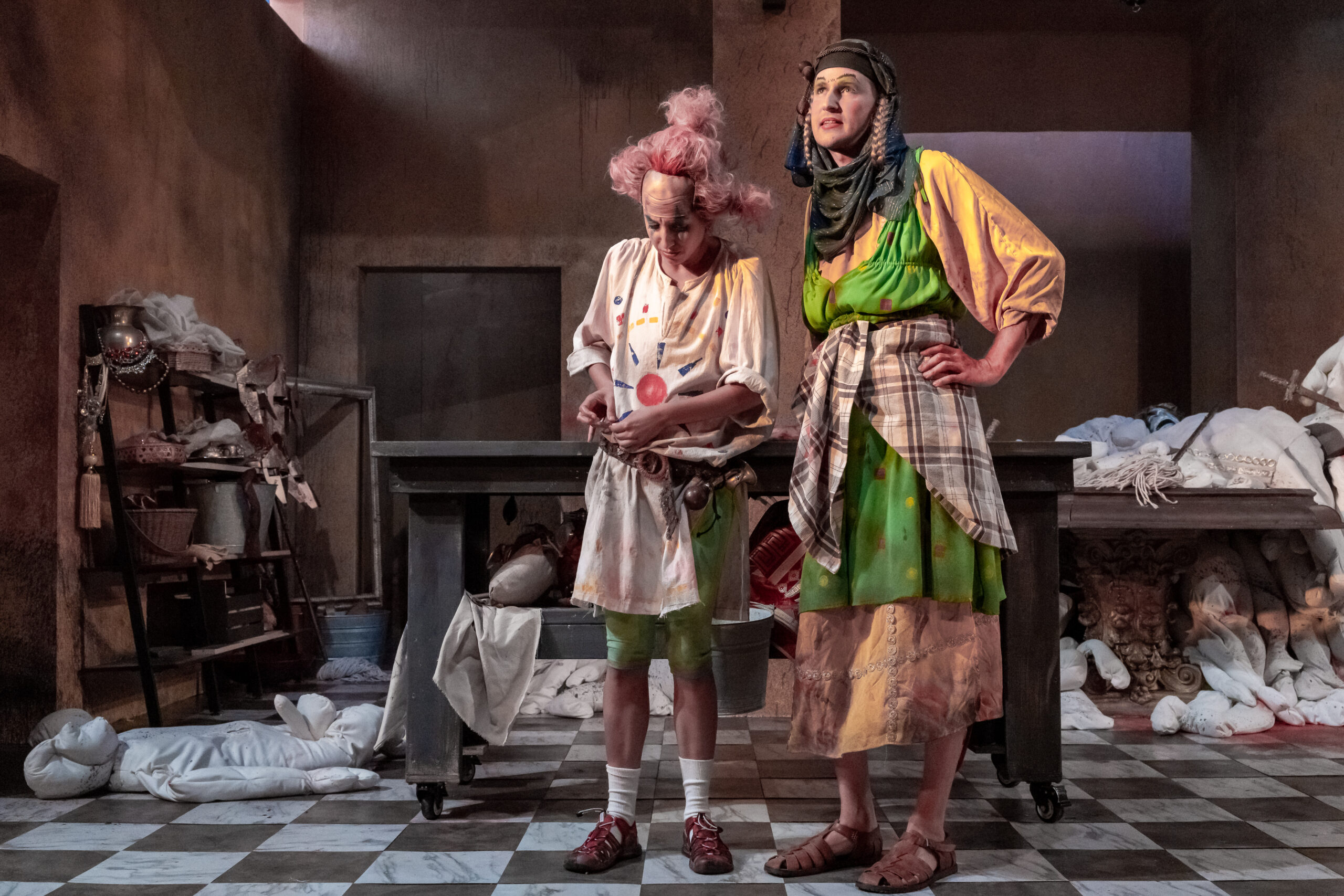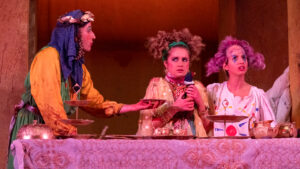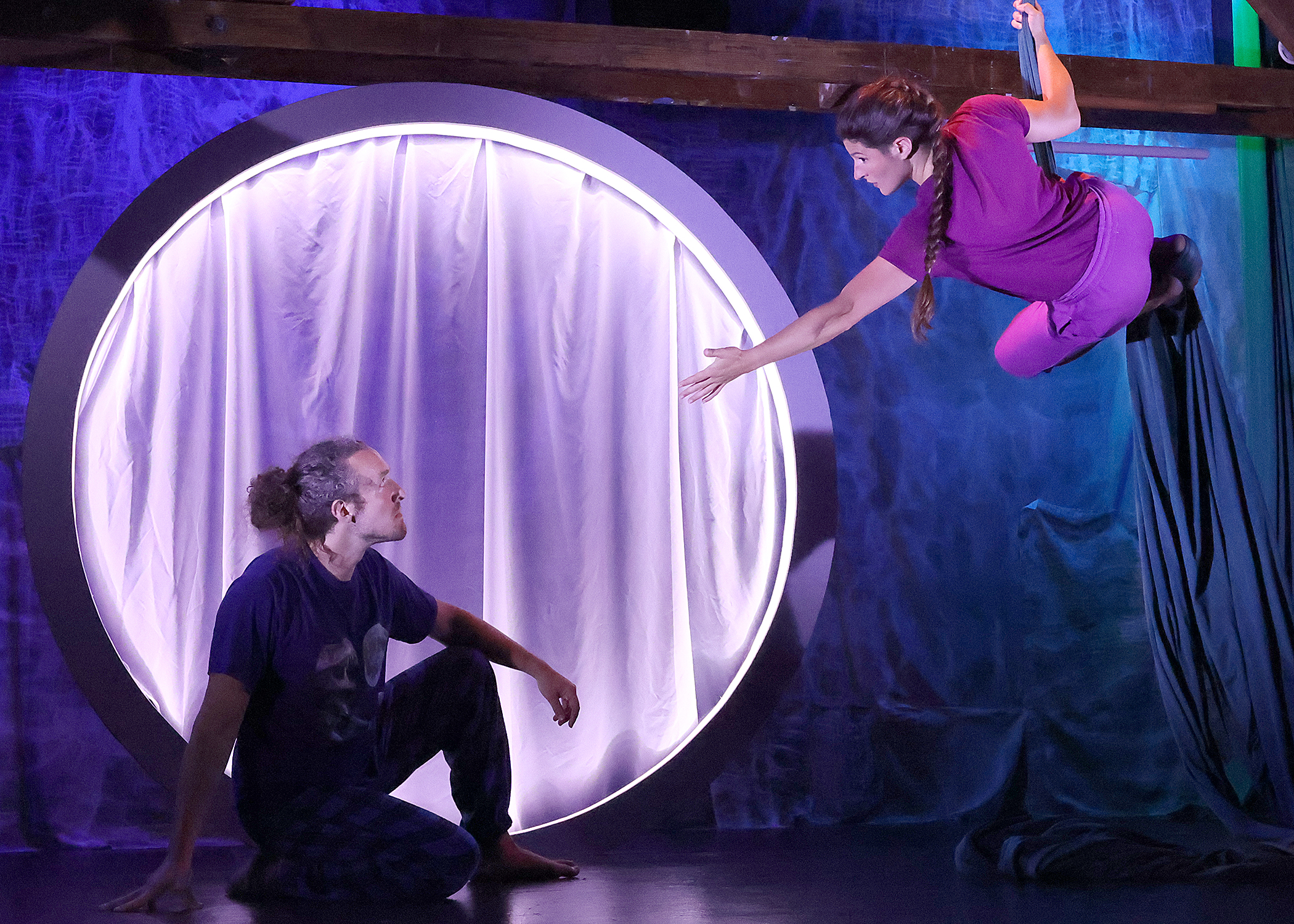
A Sequel That Couldn’t Be More Timely

History may always be written by the winners, but often it’s the observations of the common people that are more interesting—and understandable. And that’s what playwright Taylor Mac gives us in Gary: A Sequel to Titus Andronicus, now at the Wellfleet Harbor Actors Theater.
And I’ll cut to the chase: if you see only one play this summer, make sure it’s this one.
As you’ll recall, at the end of Shakespeare’s Titus Andronicus, Rome is in disarray. (Okay, you don’t have to recall it—I had to look it up, too. It’s an early and not particularly memorable play that out-gores even the bard’s goriest future tragedies, and is notable only for its prescient mention of baking corpses into pies.) We meet all three of Gary’s characters in Titus, but only as minor players; here they can stretch and take center stage, and great hilarity ensues.
The curtain opens on an anteroom to the coup that’s still in progress as the play begins; piled high with dead bodies, it’s become an informal mortuary. Enter the cleanup crew: Cockney-voiced Gary (Layla Khoshnoudi) and Janice (AJ Clauss), who know a thing or two about life in general and the upper political classes in particular.
Gary, a clown recently promoted to maid, has been given her life in exchange for helping out (all the other maids having been inconveniently killed in the coup), and veteran maid Janice trains her on how to evacuate gas and fluids from the corpses (presented as featureless ragdolls stacked in an ignominious pile). But Gary has the attention span of a goldfish and is already plotting her next professional move to “fool,” a “clown with ambition” who can speak truth to power. In the meantime, though, she has a lot of truths to share in the here and now.
Not that Janice doesn’t. He (we’ll get back to those pronouns in a minute) isn’t best pleased to have to explain things to a new recruit. “You think this is me first massacre?” he demands. “You think I sat idle on the Ides of March?”

We met Carol the midwife (Lacy Allen) briefly before the curtain went up; despite a slit throat, she has managed to survive, and now crawls out unexpectedly from under the pile of corpses. She has a middle-class English accent, unlike the Cockney of the other two characters, and her class is reflected in her language, her dress, and her attitude. She was unable to save the baby she’d just delivered at the end of Titus, and now is fearful she may have been consigned to the underworld because of it.
It’s not all fun and bodily-fluid jokes; Gary thoughtfully observes that anyone in their position might possibly not be living their absolute best life. And as the characters continue their cleaning (with a break for tea, of course) and bantering, it begins to dawn on the audience that 400 CE Rome seems to be in far too many ways an awful lot like 21st-century America.
Director RJ Tolan never belabors that point, however, and it’s his light touch that keeps the story moving along, from Monty Python-esque bawdy humor to moments of reflection—and back again. It’s as though he holds up a mirror to the audience, but then quickly puts it down and allows them to relax. Until the next time.
Changing the gender of characters to go against conventional casting is something we’ve all seen before, perhaps especially here on the Outer Cape, and while it usually smacks of a gimmick, here it just works. Khoshnoudi’s Gary is sprite-like and almost magical, a fairy that may have gotten her wires crossed and stepped out of a different play on a midsummer night. And Clauss’ steady, practical, workman-like Janice underscores the impossibility of the task before them and the misogyny of assuming women will always be around to clean up men’s messes. (After all, as they point out subversively, “cleaning is immoral” with “massacres always floating about.” What would happen if the cleaners all revolted?)
It has to be said: all three actors are pitch-perfect. One would think Allen might struggle with truly appearing more than halfway through the story, but she steps in with grace and aplomb and her own brand of humor. And Khoshnoudi and Clauss are simply brilliant.
They each have a moment of tearing down the fourth wall: Carol at the outset of the play, Janice when she asks an audience member for a mint, and Gary at the end when she reminds us of the theatre’s primordial rule, to never work with babies dressed as fish. (Don’t ask: go see it, and all shall be revealed.) I liked those moments; Mac is clearly allowing us to take the story whichever way we choose, but slyly reminding us at the same time that we have other lives to go back to that may need a little attention so maybe we don’t get to the mopping-up-of-corpses stage in our own world. “You can’t turn it back the way it was,” says Gary. “You have to make something of it.”
Or maybe not. Maybe it’s just enjoying listening to La Vie En Rose in Latin. Or laughing at dancing penises. Maybe that’s really all there is.
You decide.
Images: Michael & Suz Karchmer
More Recent Provincetown News




 Accommodations
Accommodations  Art
Art  Bars
Bars  Books
Books  Entertainment
Entertainment  Events
Events  Featured
Featured  Guides
Guides  History
History  Literary stuff
Literary stuff  Most Popular
Most Popular  Provincetown News
Provincetown News  Restaurants
Restaurants  Reviews
Reviews  Shopping
Shopping  Theatre
Theatre  Uncategorized
Uncategorized  Weed
Weed